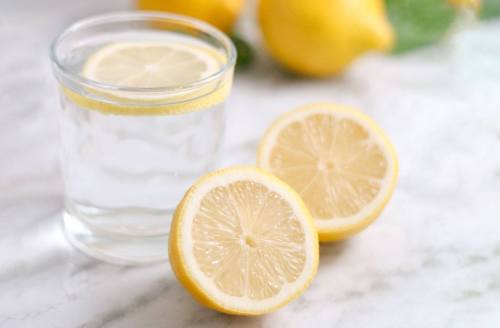Why a Naturopathic Doctor Thinks the Benefits of Lemon Water Are Largely Overhyped
A naturopathic doctor explains whether all the big claims around the benefits of lemon water are true or not, based on scientific research.

If there’s one thing that unites women from all different wellness cliques—A-list nutritionists, natural beauty bosses, and fitness fashion moguls alike—it’s gotta be drinking lemon water. (And let’s not even try and count all the celebrities who’ve made it a part of their a.m. routines.)
Experts in This Article
naturopathic doctor, nurse practitioner, holistic coach, and founder of Seven Senses
The benefits of this quick-and-easy practice are supposedly many, ranging from brighter skin to improved digestion to a boosted immune system and beyond. Of course, these are all welcome side effects of staying well-hydrated, even without a lemon slice in your glass. Which raises an important question: Is that little squeeze of citrus actually doing much more for our bodies than plain water would?
To find out, I consulted naturopathic doctor Erica Matluck, ND, NP, who started by filling me in on the ancient roots of this modern wellness craze. “While drinking lemon water is an Ayurvedic tradition, there are reports of many historical cultures using lemons for medicinal purposes—Egyptians, Greeks, and Romans,” she explains. “The earliest clinical benefits of lemons were observed in 1747 by the Scottish physician James Lind, who added lemon juice to the diets of seamen with scurvy. Though he concluded that lemon juice was effective, he found oranges to be more effective.” (Makes sense, since oranges are higher in immune-boosting vitamin C than any other citrus fruit.)
While there’s been some clinical research on the nutritional value of lemons since then, Dr. Matluck says there have been “few, if any, randomized, controlled studies” on lemon water specifically. (Womp, womp.) “We know about the health benefits of many of the constituents of lemons, but we don’t have a good body of research to know if adding some lemon juice to your water provides a sufficient amount of any of these constituents to get all of the potential benefits,” Dr. Matluck explains.
So does that mean we’re getting no benefit from putting lemon wedges into our S’well bottles? Not quite. Here, Dr. Matluck puts some of the most common claims around the benefits of lemon water under a microscope, based on the data we do have.
Which of the benefits of lemon water are actually legit? Let’s investigate.

1. Lemon water may help treat kidney stones
This one’s actually true, according to Dr. Matluck. “The citric acid in lemons can help break up and prevent certain types of kidney stones,” she says. Indeed, researchers have found that drinking four ounces of lemon juice (or orange juice, or melon juice) in tap water increases citrate levels in the urine—which, in turn, can help ward off kidney stones.
2. It might promote healthier skin
Many a wellness influencer has credited her clear, glowy skin to her warm lemon water habit. But this probably has more to do with the water itself than the lemon. “Though vitamin C has been shown to provide benefits to skin, there is no evidence to support that consuming lemon water will do the same,” says Dr. Matluck.
Staying hydrated, on the other hand, is indisputably one of the best things you can do for your complexion. So yes, keep drinking all the H2O—and, by all means, add lemon if you dig it. If vitamin C’s skin-protective properties are what you’re after, eat a wide range of foods with vitamin C and invest in a topical serum.
3. It may support your body’s natural detoxification and digestive functions
“Hydration alone is supportive of the body’s detoxification processes,” says Dr. Matluck. But she says there isn’t compelling proof that lemon water specifically is better at detoxifying you than regular H2O. The same goes for the digestion piece, she adds—and besides, if you’re having digestive issues, your doctor should really be your first port of call. “There are many different causes for digestive problems so the first step toward treatment is identifying the cause,” she points out.
It should be noted that lemon water may also support healthy weight management, but not in the way that has often been advertised. “Drinking lemon water on its own is not a sufficient weight-loss strategy,” says Dr. Matluck. “However, it may be a supportive component of a more holistic program.” For one thing, a 2011 study showed that drinking water before meals can result in accelerated weight loss, presumably because the water helps promote feelings of fullness, which could prevent overeating. If you’re trying to cut back on sugar-laden drinks throughout the day, lemon water may be a more enticing alternative than plain water.
Here’s how to make an anti-inflammatory “beauty water” infused with lemon, orange, and hibiscus:
Okay, so what claims about lemon water are really just hype?
1. It doesn’t “boost” your immune system
Unfortunately, if lemon water is part of your cold-proofing arsenal, it probably isn’t doing much of the heavy lifting. “Lemons are high in vitamin C, which is supportive to the immune system,” says Dr. Matluck. “But the amount of vitamin C you consume by adding lemon to water is not likely enough to boost the immune system.” The recommended daily allowance of vitamin C for women is 75 mg, and an entire lemon contains a third of that amount. Yet studies have found that more than 1 gram (1000 mg) per day of vitamin C is needed to help reduce the duration of a common cold.
If you feel like you’re coming down with something, you’d be better off taking a supplement with at least 1,000 mg of vitamin C. (Unless you actually want to consume 34+ lemons in a day…)
2. It doesn’t “balance” your body’s pH levels
Some holistic health experts stress the importance of eating alkaline foods—fruits and veggies, mainly—as a means of counteracting all of the acidic foods in the standard American diet, which are said to cause acidity in the body and, in turn, disease. (Think meat, dairy, and processed foods.) But that’s not actually the way our biochemistry works, says Dr. Matluck.
“The pH of the body is very tightly controlled,” she explains. “Though lemons are considered an alkalinizing food, your diet will not significantly change the pH of your blood.” That said, tons of studies have found that eating a plant-heavy, whole-food-based diet is highly beneficial to health for reasons other than pH balancing, and lemon water can certainly be a part of that.
So should we be drinking lemon water or nah?
To sum all of this up, Dr. Matluck hasn’t seen enough science to suggest that drinking lemon water is superior to drinking regular water if you’re not doing it to prevent kidney stones.
But I’m not here to be a total lemon water buzzkill. There is one other reason why you might want to go for lemon water, in Dr. Matluck’s opinion: “It does taste better!” If that’s gonna tempt you to drink a little more water—enough so that you’re peeing every two to three hours for optimal hydration—then bring on the sour stuff.
This story was published on January 31, 2019. It was updated on October 27, 2020.
Alkaline water is another wellness beverage with some dubious claims attached to it—here’s the 411. And if you still prefer it to the regular stuff, this is how to make alkaline water at home.
Sign Up for Our Daily Newsletter
Get all the latest in wellness, trends, food, fitness, beauty, and more delivered right to your inbox.
Got it, you've been added to our email list.










